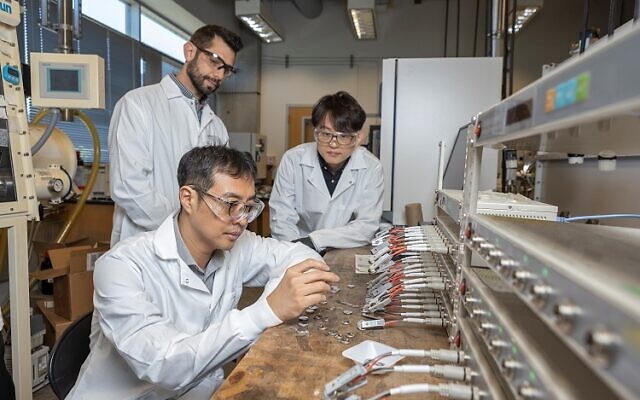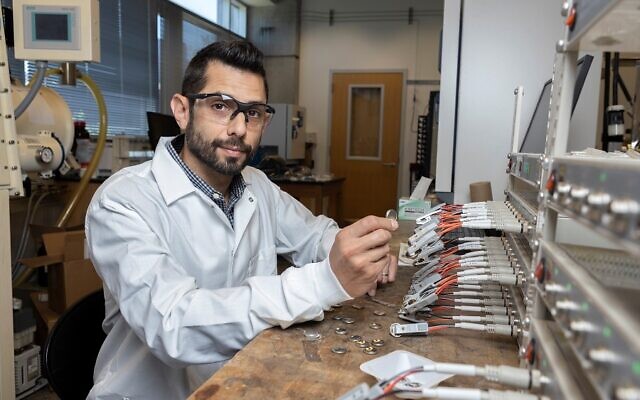Physics Whiz Stern Focuses on Energy Solutions
Dr. Ilan Stern, as a research scientist, is working on new ways to solve energy problems.
After 37 years with the Atlanta Journal-Constitution and now with the AJT, , Jaffe’s focus is lifestyle, art, dining, fashion, and community events with emphasis on Jewish movers and shakers.
If you don’t know what resilient infrastructure and supply chains are about, distress not — Dr. Ilan Stern comes to the rescue with his formal physics education. His prescient selection of his area of emphasis is among the highest profile in our “greening world,” weighing the pros and cons of electric cars, for example.
What the heck will we do with those wasted batteries? Dr. Stern is on the road to being part of the solutions.
Stern was born in New York City and moved to Atlanta in 1991, when he was around 10 years old. Stern claims Atlanta as “home base” as he spent his formidable years at The Epstein School and Walton High School, then headed north for Buffalo State University, a small NCAA Division III school, to play basketball. He then transferred to The Ohio State University where he completed a bachelor’s in physics and astrophysics. Stern marched on to Tulane University and completed a master’s and PhD in applied physics, focusing on thin film deposition and characterization for energy-based device applications.

Upon completion in 2012, he was hired as a post-doc at Georgia Tech Research Institute, and has since advanced to a principal research scientist, and chief of the Resilient Infrastructure and Supply Chain Unit. Stern leads the RISC team, a research group comprised of faculty members and up to eight students, including graduate, undergraduate and high school.
Stern explained, “Most of my work is research focused, however, I built and taught a class on advanced battery fabrication and characterization. I lead a portfolio of federal- and state- and industry-sponsored contracts primarily focused on energy systems. More specifically, my current research focuses on all solid state batteries. These are the batteries of the future due to their intrinsically higher energy density, and high safety factor compared to traditional liquid electrolyte Li-ion [lithium-ion] batteries.”
Dr. Stern does not currently drive an EV but is “anxious to get into one.” He is working diligently, in his unit and nationally, to build out a national or domestic supply chain to remove the dependency on China for supply products. Stern thinks, though, that manufacturing batteries eschewing the Chinese will raise costs as they have been developing the infrastructure for years, leading to a steep drop in prices.

He explained, “In addition, China’s poor labor conditions allow for well below market compensation for their workers. In addition to the solid state innovation, we are working on full life-cycle models to build out the capabilities and enhance the efficiencies for recycling, as we are expecting to see a sharp increase in the number of EVs on the road over the next decade. What to do with those batteries in end-of-life stage will be a great indicator as to how the manufacturing and utilization will be done for future generations.”
Georgia news is full of headlines about the influx of billions of new industry dollars pouring into the state (SK Battery, for example.). Who is paying for this research? Stern’s group has both industry and federal contracts. The group likes to work with industry professionals to ensure they are addressing the needs of the manufacturers, and how to make their processes more efficient. They do this with parametric system modeling, as well as cost modeling forecasting.
Stern concluded, “This is all in conjunction with the performance models we build for the fundamental materials.”
Outside of work, Stern’s spouse, Marsha, is a physician at Emory, and runs a collaborative clinic at Grady Hospital (internal medicine and psychiatry). They have three boys: Aiden (7), Zachary (5), Benjamin (1). Stern coaches Aiden and Zachary’s baseball teams, and Aiden’s summer travel baseball team. As “super dad” Stern continues to be an avid basketball player, he also knows his way around the tennis court.




comments